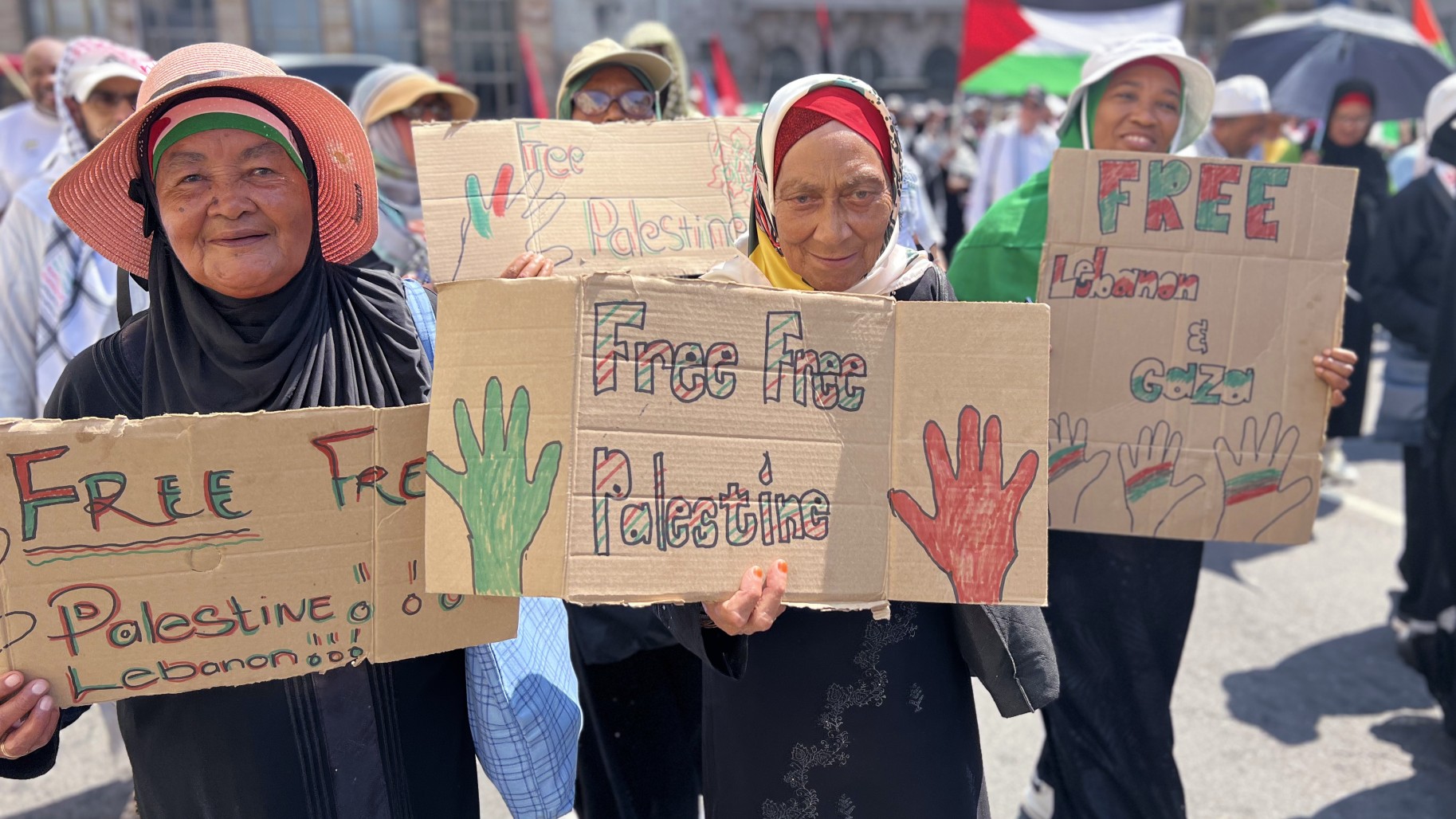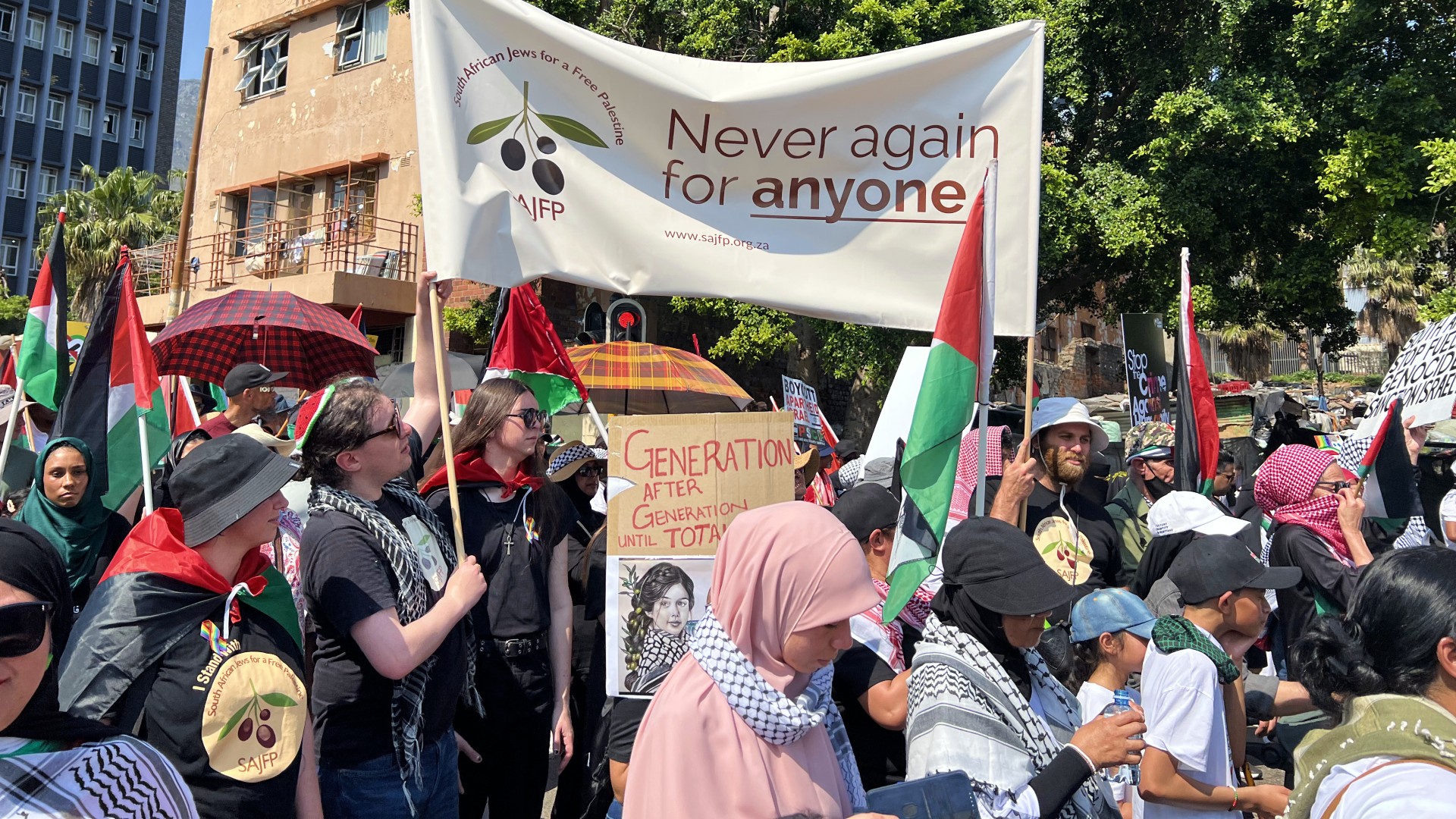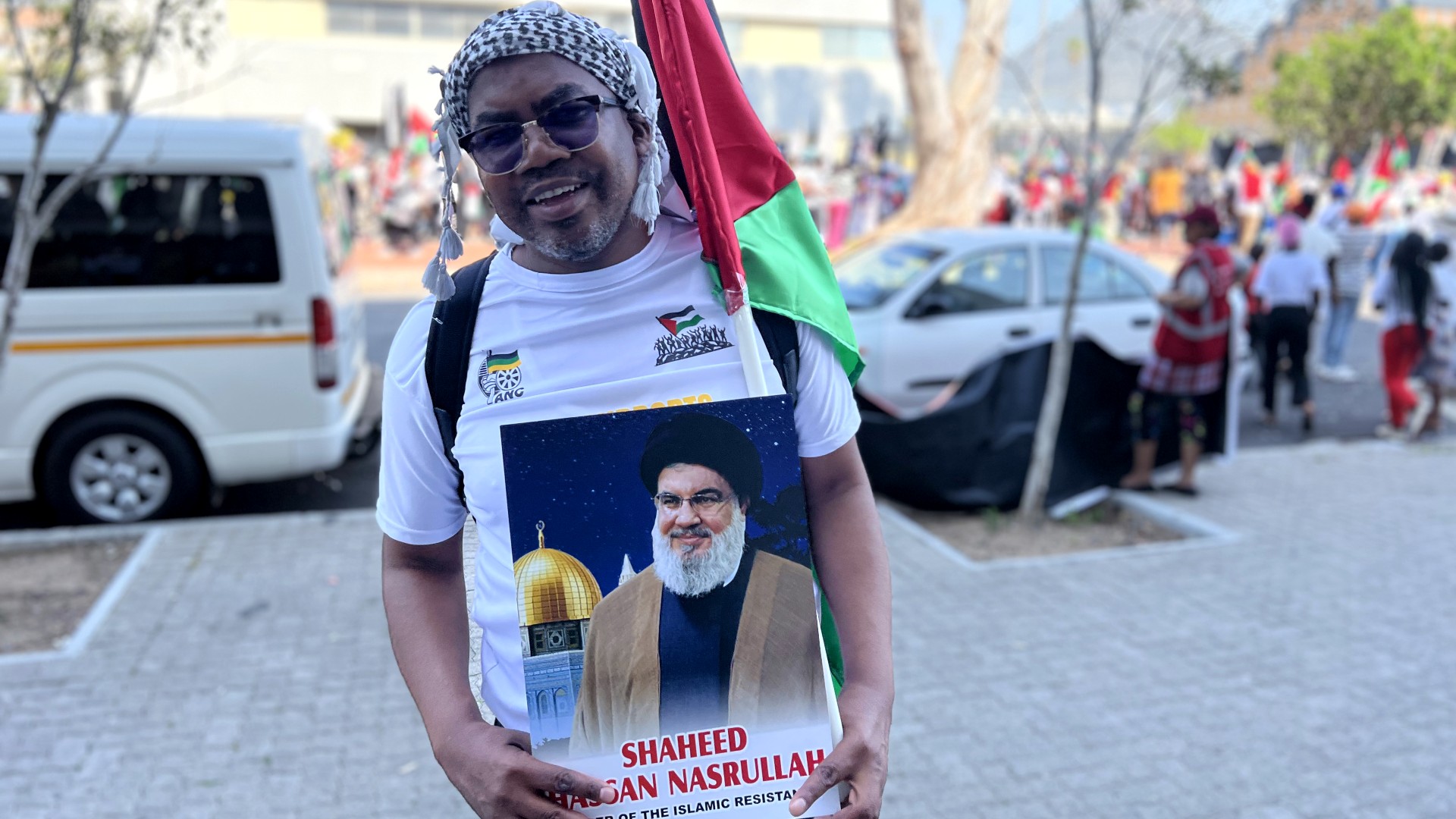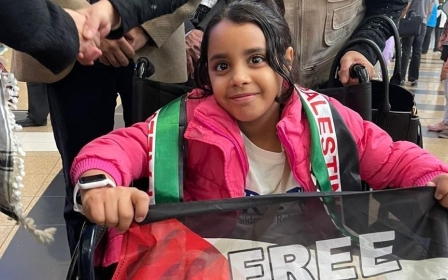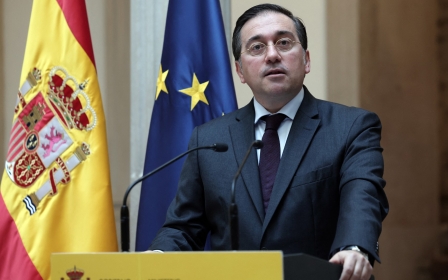Why so many white South Africans are reluctant to support Palestine
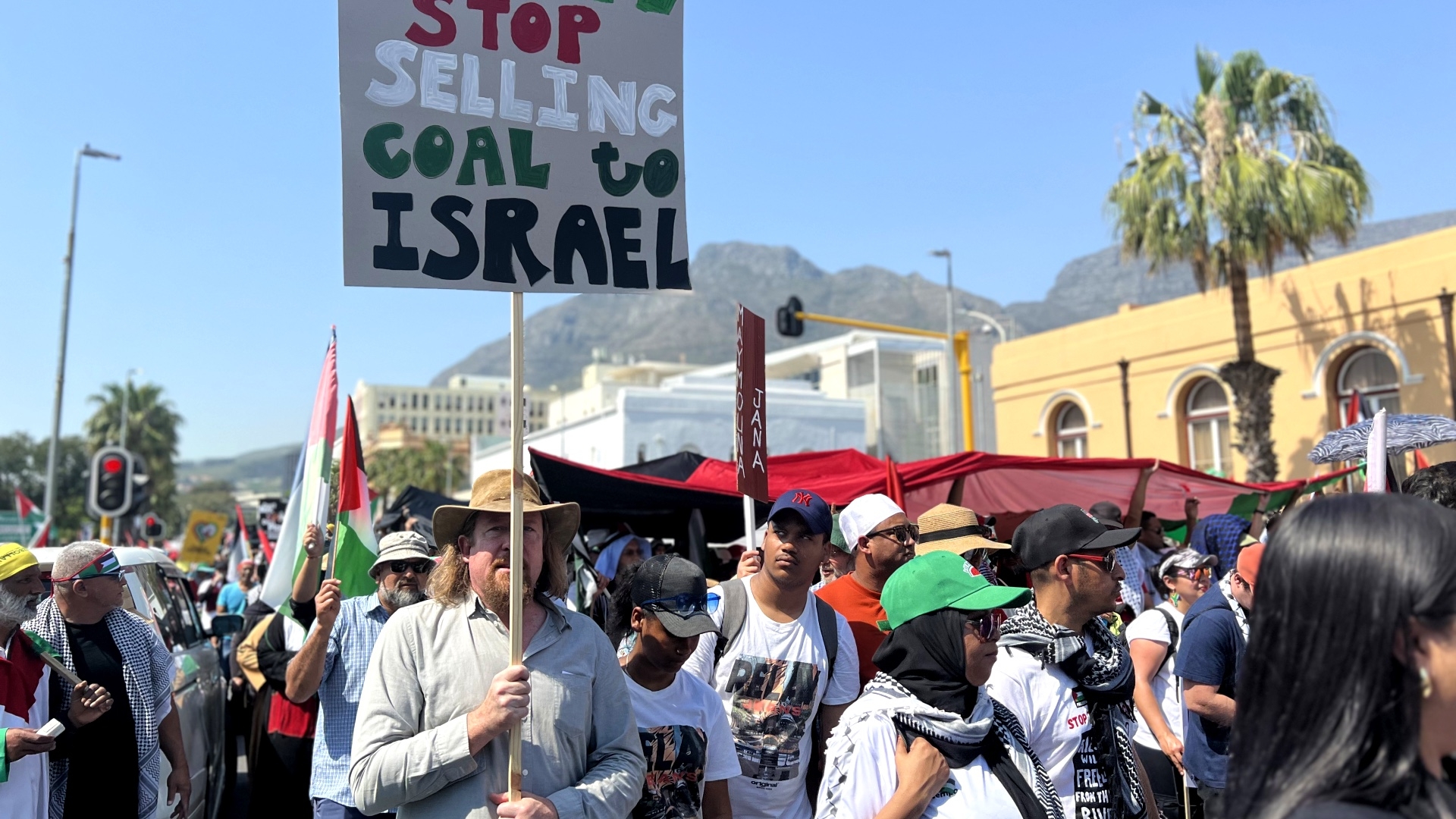
It's a balmy spring day in downtown Cape Town where thousands of South Africans have gathered to commemorate one year since the devastating Israeli war on Gaza began.
As they have done a hundred times before, the protesters, draped in green, black and red, marched through the streets; their cries to end the war echoing off the walls of the old colonial-era buildings in Cape Town's central business district, and their chants hanging over transfixed passersby and informal street vendors.
The procession organised by a cluster of activists and human rights groups brought the typically peppy Saturday morning traffic to a standstill.
Protests for Palestine in South Africa are not exceptional.
As a country that enjoyed support and solidarity from Palestinian organisations and leaders during the apartheid years, post-apartheid South Africa’s open and explicit public opposition to Israel is a matter of foreign policy.
New MEE newsletter: Jerusalem Dispatch
Sign up to get the latest insights and analysis on Israel-Palestine, alongside Turkey Unpacked and other MEE newsletters
In December 2023, this culminated in Pretoria launching a landmark case against Israel at the International Court of Justice (ICJ) on the charge of genocide.
The court ruled in January that Israel's acts in Gaza amounted to a "plausible case of genocide".
But between the placards and the slogans, the keffiyehs and the Palestinian flags at the protests; and behind the graffiti around the Bo Kaap neighbourhood in Cape Town and beyond South Africa's case at the ICJ, observers and activists say the optics unveil an open secret: only a handful of white South Africans have come on board to express support for Palestine.
The Hamas-led attacks on Israel on 7 October killed 1,200 people and saw over 200 taken back to Gaza as hostages. Since then, Israel has pummelled the besieged enclave with air strikes and a deadly ground invasion, with estimates varying from 42,000 to 180,000 Palestinians killed and more than a million displaced several times over.
South African activists note that since the war on Gaza began, support for Palestinians has been primarily from Black and brown South Africans.
Activists say the community, who benefited from apartheid rule in South Africa for several decades, have either demonstrated an indifference to the war on the Palestinians or employed a roaring endorsement of Israel's "right to self-defence".
"It's disappointing that so few white people are interested," Doug Falconer, a protester in Cape Town, told Middle East Eye. "It's unfortunate. They should have learnt from our history," Falconer added.
Reenacting apartheid-era South Africa
Since the early 1960s, Israel's treatment of the Palestinians has drawn comparisons to apartheid in South Africa.
As early as 1961, South Africa's prime minister Hendrik Verwoerd, considered the architect of apartheid, compared South Africa's system of racial segregation to Israeli policy towards the Palestinians.
"Israel, like South Africa, is an apartheid state," Verwoed said in 1961.
Over the past decade, as conditions in the occupied West Bank and Gaza have become ever more severe, several human rights organisations have formally endorsed the label as a description of the laws and policies targeting Palestinians.
"Israel imposes a system of oppression and domination against Palestinians across all areas under its control: in Israel and the OPT, and against Palestinian refugees, in order to benefit Jewish Israelis. This amounts to apartheid as prohibited in international law," Amnesty International said in February 2022.
Despite the growing consensus over the analogy, South Africans who either lived under apartheid or scholars who studied the system, say Israel has now surpassed the horrors of apartheid in South Africa.
"Israel is worse than apartheid South Africa. Their criminal activities and atrocities against children, the vulnerable, the old, the hospitalised; the destruction of the schools, clinics, and the killing of innocent people in Palestine," Lulama Ngcukayitobi, provincial secretary of the ANC in the Eastern Cape, told Middle East Eye.
"This genocide against Palestine is worse than anything a person can ever think of," Ngcukayitobi said.
In his book, Neoliberal Apartheid: Palestine/Israel and South Africa after 1994, Andy Clarno writes that scholars have since demonstrated that apartheid in Israel was "an updated [and] potentially more extreme version".
For some, understanding why white South Africans have not come out en masse to show solidarity with Palestinians speaks to a long collusion between Israelis and white South Africans, as well as how they locate themselves in South Africa itself.
"I think it's logical. [South Africa] is still a settler-colonial country. White people are still settlers in this country and naturally see themselves as Jewish Israelis, rather than as the Palestinians," Falconer, said.
"The economy is the real centre of power and white people still control the economy. And in that sense, it's still a colony. Things have changed politically, but not economically," Falconer added.
Likewise, Ngcukayitobi said that it seemed to him that some white South Africans were "still holding back to the thought that there could be a reversal of all the progress that has been done in South Africa".
"They think they can reenact apartheid," Ngcukayitobi said, adding the Black and brown people who routinely show up for Palestine did so because they could naturally identify with the oppression faced by those in Palestine.
End of apartheid
Apartheid South Africa began dismantling in the early 1990s, with the country's first democratic election taking place in 1994, ushering in Nelson Mandela as the first post-apartheid president of South Africa.
But while political power was transferred to the Black majority, economic power and land ownership were left largely in white hands.
Thirty years later, a majority of Black South Africans remain largely impoverished, languishing without jobs, and often, without basic services.
While the gap between Black and white South Africans has narrowed ever so slightly, the gulf between rich and poor has swelled. The richest 10 percent own 85 percent of the wealth in the country.
White South Africans make up seven percent of the country and own much of the country's commercial land. They also dominate the upper echelons of corporate structures.
In 2022, South Africa's Commission for Employment Equity found that white South Africans occupied 65.9 percent of top management-level posts, whereas Black people occupied just 13.8 percent.
Today, South Africa is one of the most unequal countries on the planet, exemplifying the legacy of apartheid-era policies as well as the slow redistribution of wealth and economic power.
Despite the economic indicators suggesting otherwise, white South Africans continue to grasp false narratives of being subject to a "white genocide" in the country.
Observers say that white South Africans are a product of their exploitation and continued privilege, just as Israeli anxieties are a result of the colonial violence that created the state of Israel.
It's not surprising then that a leading Jewish school in Cape Town would be open to Israeli soldiers using the institution to recruit for the Israeli army.
"Many white people still see themselves as besieged and protecting what they see as rightfully theirs," Falconer says.
This "besieged mentality" has culminated in white farmers recruiting former Israeli army commandos to train them against government-proposed land redistribution policies. It has also seen the flight of white South Africans to western countries, including Israel.
In 2021, one percent of the Jewish South African community moved to Israel.
This follows more than an estimated 20,000 South African Jews who moved to Palestine in the 1920s and Israel since 1948. In 2021, Haaretz reported on a trend of "several hundred" Christian Afrikaners converting to Judaism and escaping to Israel and eventually into the illegal Israeli settlements in the occupied West Bank.
'Just move on'
Searching a respite from the crowds and the harsh sun, 42-year-old Aadila Jada slumps onto a shaded pavement adjacent to the large procession snaking its way around the city.
"Looking at the history of South Africa and where we are and where Palestine is, and has been since 1948, it is important for us as South Africans to understand the impact the occupation of Palestine has had not just on Palestinians, but on the world," Jada tells MEE.
"It was important for me to bring my children," she says, gesturing at the four youths seated alongside her, "to encourage and educate them to be able to connect with people who are going through a struggle that was actually way worse than ours."
Jada, whose parents were in a mixed-race relationship during apartheid, said that she was a little hesitant to beat down on all white South Africans, given that she personally knew several who opposed apartheid and Zionism. However, she noted that the white community "could be more involved", given their size and influence in the country.
White South Africans make up 16 percent of the population in Cape Town.
"I think there could have been [a] bigger presence from white people, but I also think there could be more Black people here, too," Jada said, observing that many of the protesters in the October protest in Cape Town were made up of "coloured people" (the term used by South Africans to describe mixed race), Indian and Cape Malay heritage.
Others, like Cherie Adendorff, a volunteer with the Palestine Solidarity Campaign (PSC) in Cape Town, are less generous in their assessment.
"Most white South Africans I speak to about this are mostly oblivious as to the scale of the ongoing genocide or simply repeat uninformed Israeli and western talking points," Adendorff told MEE.
"In terms of meaningful action and support (like simple boycotting of brands) and sustained action, I can’t say I’ve seen much of an adjustment."
Adendorff says there is a general sense of fatigue as well as frustration and annoyance directed at those who refuse to give up on the cause.
"It’s giving us 'just move on' energy - especially now as we head to SA’s beloved December period where white people don’t want to take in the injustices of the world while they plan their holidays," Adendorff added.
Contradictory position
Despite its billing as a beacon of solidarity for Palestinians, South Africa's relationship with Israel is replete with contradictions.
In 2018, South Africa downgraded its embassy to Israel to a liaison office. However, trade between the two countries continues to grow, with Pretoria providing Israel with coal for much of its energy needs.
Falconer, who brought a sign to the protest, calling for an end to the sale of coal to Israel, says that he remembers how apartheid South Africa was crippled by sanctions. He says withholding coal is the natural stage in holding Israel to account.
Following Colombia's decision to halt the sale of coal to Israel, South Africa is the second largest supplier of coal to Israel.
"South Africa may be powering the Israeli war machine that it has accused of genocide, and undermining the very judgment that found in its favour," South African activist Suraya Dadoo wrote in a recent opinion article in The Africa Report.
Likewise, some of the country's highest-ranking universities continue to prioritise close ties to Israeli organisations and institutions. Administrators have refused to disclose the extent of their ties.
In a context in which Palestinian universities in Gaza have been demolished, activists say the refusal to cut ties with Israel is a failure of South African universities to show solidarity with their Palestinian counterparts.
Long-time anti-apartheid activist Ronnie Kasrils says that part of the reason white South Africans and South African Jews continued to support Israel was due to an oversized dependence on western media narratives about Palestinians.
"A small but important number of whites attend protests and demonstrations in mainly Cape Town and Johannesburg, and support both the BDS (Boycott, Divestment and Sanctions) campaign and South African Jews For Palestine," Kasrils, who is also Jewish, said.
"We do note there is growing concern by many amongst them but not to the extent that they are prepared to join in the protests," Kasrils added.
Kasrils' observation is corroborated by other organisers and observers, who note a slight increase in the number of white South Africans participating in expressed solidarity actions for Palestine over the past year, but add there is a hesitation over the fear of reprisals, including the threat of losing a job, being socially isolated, or being charged with antisemitism.
Just as the mainstream Zionist organisations are known to weaponise antisemitism in the United States, organisations defending Israel in South Africa have sought to conflate criticism of Israel with antisemitism.
For instance, in January, when South Africa took Israel to the ICJ, the South African Jewish Board of Deputies (SABJD) described South Africa's effort at the ICJ as "antisemitic".
"In the words of former Minister of Justice of Canada and human rights activist, Irwin Cotler, South Africa is inverting reality by accusing Israel of genocide. The fact that South Africa has bought into this inversion, to the extent that it has taken Israel to the International Court of Justice (ICJ), can only be interpreted as antisemitic ... Global Jewry are united that these charges have at their root an antisemitic worldview, which denies Jews their rights to defend themselves," the SAJBD said in a statement.
Josh Michelson, a Jewish South African activist in Cape Town, described the mainstream Jewish organisations in South Africa as "extremely Zionist".
“The number of Jewish South Africans who are anti-Zionist make up a small number, like one to two percent of the community," Michelson told MEE.
“There are others who want to show solidarity but they are afraid they would lose their jobs or face censure ... some people are also uncomfortable taking part in the marches," Michelson added.
Several South Africans told MEE of threats and intimidation levelled over support for Palestine in South Africa.
In February 2024, Naledi Pandor, the then minister of international relations and cooperation, said she along with her family had received threats over the government's decision to take Israel to the ICJ.
The South African government was also described as the “legal arm of Hamas” while Pandor was slandered by Israel as a supporter of the Islamic State militant group.
“The Israeli agents, intelligence services, this is how they behave, and they seek to intimidate you…we must not be intimidated. There is a cause that is underway,” she said.
Meanwhile, on the streets, protesters and organisers in South Africa are calling for more action from the government, including severing diplomatic ties and ending economic relations.
They are also calling for more people to come out onto the streets.
"It's unfortunate that many people see this as a Muslim issue. It's not a Muslim issue, It's a humanity issue," Falconer said.
Middle East Eye delivers independent and unrivalled coverage and analysis of the Middle East, North Africa and beyond. To learn more about republishing this content and the associated fees, please fill out this form. More about MEE can be found here.


